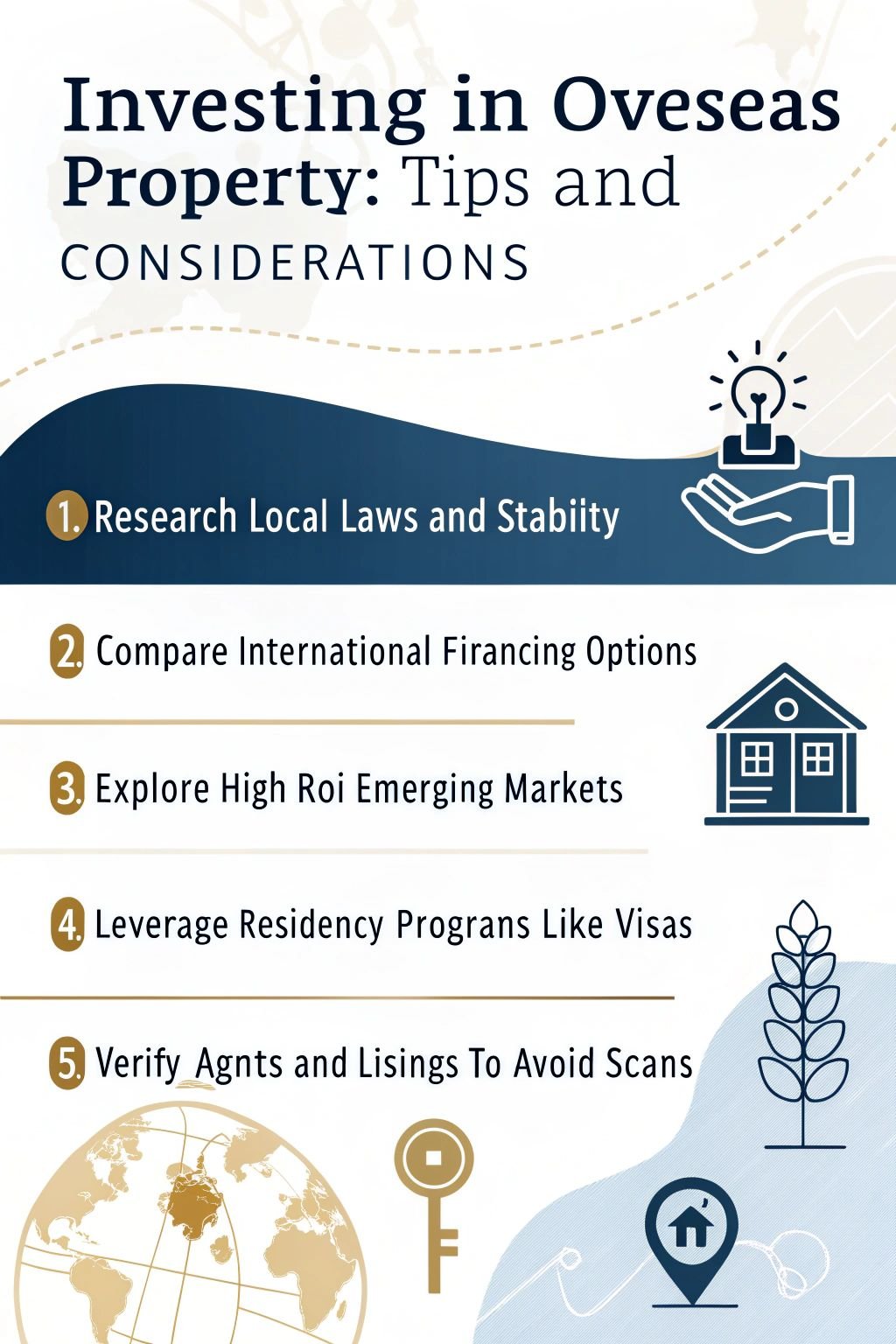Buying property overseas can feel overwhelming. From understanding foreign laws to dealing with currency exchange, there are many factors at play. You might worry about making costly mistakes or losing money because of fluctuating exchange rates or hidden fees.
These challenges can discourage even experienced investors from exploring international real estate opportunities. 2
Investing in overseas property has its rewards when done right. For instance, owning a second home abroad could provide potential rental income and access to financial benefits like Golden Visa programs or tax exemptions. 1 This article will guide you in making well-informed decisions by breaking down key tips, risks, and opportunities for buying property abroad.
Stay tuned to learn how investing internationally could strengthen your portfolio! 3
Key Takeaways
- Research local laws, ownership rights, and political stability before purchasing property abroad. For example, Thailand restricts foreign land ownership.
- Assess financing options such as international mortgages or developer loans. Developer loans often come with interest-free terms for preconstruction properties.
- Growing markets like Southeast Asia offer higher ROI (8–10%) and reduced living expenses compared to developed regions.
- Programs like Portugal’s Golden Visa provide residency opportunities with real estate investments starting at €500,000.
- Prevent scams by confirming property listings and collaborating exclusively with licensed agents or brokers well-versed in the market.

Investing in Overseas Property: Tips and Considerations

Buying property abroad can offer exciting opportunities, but it also requires thorough preparation. Discover methods to evaluate costs, examine ownership rights, and handle currency variations efficiently.
Why Invest in International Property?
International property offers promising opportunities for growth and profit. Emerging markets, like Southeast Asia and parts of Europe, often provide higher ROI in real estate investment compared to more established regions. 1 Many foreign investors are drawn to these areas due to lower costs and rising property values fueled by economic expansion. With inflation rates impacting local markets, diversifying your assets internationally can help protect against currency shifts.
Owning a second home or vacation property abroad provides access to affordable living while generating rental income potential. For example, in countries where the cost of living is lower—$1,174 per month for an individual—it’s easier to save funds while enjoying such benefits as reduced expenses and a more relaxed lifestyle.
A rental income tax may apply, but many locations offer tax exemptions or double taxation treaties that ease financial burdens for foreign buyers. 1
“Investing overseas isn’t just about returns; it’s also about creating lifestyle options,” says Jay Hernandez, Chief Editor at Real Estate Insights.
Factors To Consider Before Buying Property Abroad
Buying property abroad can be rewarding, but it requires careful planning. Consider these key factors before making your investment:
- Understand Local Laws and Ownership Rights
Study the property laws in your target country. Certain countries, like Thailand, restrict foreigners’ rights to own land. Look for details on title deeds and ownership limits to avoid surprises. - Check Political Stability
Examine the political and economic situation of the country. A stable government decreases risks tied to sudden law changes or property seizures. Research recent news and data about inflation rates and policies.2 - Account for Language Barriers
If you don’t speak the local language, hire a translator or consider learning key terms. Miscommunication can cause legal issues during transactions or contract reviews. - Evaluate Exchange Rates and Currency Fluctuations
Track exchange rate movements between your home currency and the foreign one. A sharp currency drop could reduce your investment’s value or increase payment costs for loans. - Review Tax Obligations
Investigate property taxes, capital gains tax, rental income tax, and double taxation agreements between countries. Some nations offer tax exemptions that may benefit you financially.3 - Consider Financing Options
Research international mortgages through lenders or developer financing options available locally. Compare down payments, interest rates, monthly mortgage requirements, or alternative funding sources like self-directed IRAs. - Analyze Market Conditions
Gather insight on real estate trends in that region—ask local brokers about demand for vacation homes or retirement properties to predict capital appreciation potential. - Hire Legal Experts with Local Knowledge
Work with lawyers familiar with foreign real estate laws who can guide you through contracts, registrations, and disputes if needed. - Investigate Infrastructure Quality
Check utilities like electricity access as well as roads or public services near properties of interest—especially in areas offering high ROI returns quickly. - Assess Your Long-Term Goals
Decide whether it’s for passive rental income, long-term wealth growth, or simply buying a second home near preferred travel spots!
How To Finance A Property Abroad
Cash purchases simplify the process. Paying upfront often results in discounts and quicker closings. Many overseas markets favor this method, as fixed-rate 30-year mortgages are rare outside the U.S. 4
International mortgage lenders might provide financing but enforce stricter criteria for noncitizens. Your credit history, income proof, and foreign exchange stability affect approval.
Explore developer loans or equity release as other options for funding your investment property abroad effectively.
Benefits of Buying Property Overseas

Owning property abroad can boost your income through rentals or future sales. It also provides access to opportunities like affordable living and new cultural experiences.
Higher ROI on International Real Estate Investments
Investing in international real estate can significantly boost your financial growth. Emerging markets often offer rental yields as high as 8-10%, surpassing returns in many developed countries. 5 Properties in regions like Southeast Asia or parts of Eastern Europe frequently experience higher property value appreciation due to rapid economic development and increased demand.
Expanding your portfolio through foreign investments introduces stability. Real estate overseas acts as protection against domestic economic shifts, especially during market downturns.
“You’re not just buying a property; you’re securing global financial stability,” says licensed broker Jay Hernandez.
Choosing countries with lower taxes helps maximize profits from capital gains or rental income tax savings. Favorable exchange rates enhance your purchasing power while reducing overall costs, ultimately increasing ROI potential over time.
Lower Cost of Living
Affordable real estate options overseas make living costs much lower for expats. Countries like Portugal, Spain, and Greece offer property at prices far below U.S. standards. 6 For example, a single person in the U.S. spends an average of $1,174 per month on basic expenses.
Overseas in places like Thailand or Vietnam, those costs can drop significantly with a comparable quality of life. 6
.
Lower property prices often align well with favorable exchange rates in emerging markets. Southeast Asian countries such as Malaysia also provide cost-effective housing opportunities without sacrificing comfort or modern amenities.
By owning a retirement property abroad, you reduce day-to-day expenses while enjoying benefits like local tax exemptions or cheaper healthcare services—all factors enhancing your overall financial freedom!
.
Expat Lifestyle Opportunities
Owning property overseas can provide you with a vibrant expat lifestyle. Countries with Golden Visa programs, like Portugal or Greece, offer residency benefits and affordable living options. 7 This opens doors to exciting experiences while allowing you to enjoy cultural diversity and privacy. You can also utilize properties as vacation homes, reducing costs on accommodations. 8
Take advantage of lower income tax rates in certain countries that encourage foreign real estate investments. 7 Many destinations offer cost-effective health care, making them appealing for retirees seeking financial comfort.
Living abroad expands your horizons while offering potential growth in value on your property investment.
The Rise of Luxury Real Estate in Emerging Markets

Emerging markets are witnessing a boom in luxury real estate investments. Countries with growing economies, such as Brazil and Vietnam, attract buyers pursuing high-end properties at competitive prices.
Waterfront properties alone have surged by 20% in value, making them prime assets for capital appreciation. 9 These areas also offer modern infrastructure and rising tourism potential, fueling rental income opportunities.
Economic growth drives demand for upscale developments designed for affluent international investors. You can work with reputable analysts to identify locations with political stability and strong market conditions.
High-end investments remain sensitive to economic shifts, so conducting thorough research is essential before purchasing any second home or vacation property abroad.
Key Considerations Before Purchasing

Understand the local laws and how they affect your ownership rights before buying property abroad. Evaluate political stability and market trends to safeguard your investment.
Understanding Local Laws and Ownership Rights
Different countries have unique property ownership laws, which can impact your investment. Some nations, like Thailand, restrict foreign ownership of land entirely. Others may allow it but with conditions, such as partnering with a local entity or owning through long-term leases.
Understanding these rules ensures you comply and avoid legal complications later. 1
Local zoning laws and environmental regulations also play a significant role in buying property abroad. For instance, certain areas might limit building heights or require approval for renovations.
Always review title deeds to ensure clear ownership rights and check that there are no outstanding disputes over the land or home you’re purchasing.
Evaluating Political and Economic Stability
Evaluate the country’s political stability before purchasing property abroad. Countries experiencing political unrest present higher risks, potentially resulting in sudden law changes or economic downturns. 3 Stable investment markets such as Portugal and Spain provide safer options for real estate investments.
Examine essential economic indicators like inflation rates, GDP growth, and unemployment levels. 3 A robust economy lowers risks associated with foreign currency fluctuations and ensures improved returns on your rental income or capital appreciation potential.
Assessing Market Conditions
Study the local property market closely before making any decisions. Examine historical trends to see how properties have performed over time. Check if prices are rising steadily or fluctuating.
A stable real estate market shows strong growth potential and offers better chances for capital appreciation. 2
Focus on the local economy and political stability. Countries with steady economic growth and low risks of unrest often provide safer investment opportunities. Evaluate exchange rates as well, since currency shifts can impact your property’s overall value or rental income potential when buying property abroad.
Financing Options for Overseas Property

You have several ways to fund property purchases abroad. Consider local bank funding, international mortgages, or innovative financing options based on your goals.
Local Mortgages vs. International Lenders
When purchasing property overseas, decisions regarding financing play a crucial role. Comparing local mortgages to international lenders helps evaluate your options effectively. 11
| Aspect | Local Mortgages | International Lenders |
|---|---|---|
| Eligibility | Typically reserved for local residents or foreign buyers with strong ties to the country. | More flexible options for non-residents investing in international real estate. |
| Availability | U.S. banks rarely offer mortgages for properties outside the U.S. due to high risks. | Specialized global lenders cater to cross-border buyers. 10 |
| Currency | Loans are often tied to the local currency, exposing you to exchange rate fluctuations. | Financing is typically offered in USD or Euros, reducing conversion risks. |
| Interest Rates | Rates may vary and are influenced by the country’s financial stability. | Rates might be higher but are arranged for international buyers. |
| Down Payments | Local lenders usually require higher down payments from foreign buyers, often up to 50%. | International lenders may offer lower down payment requirements. |
| Documentation | Loans require local legal and tax compliance, which can involve complex paperwork. | Simplified for non-residents, but still adheres to international compliance standards. |
| Processing Time | Can be prolonged due to local banking regulations and residency checks. | Generally faster, accommodating cross-border transactions. |
| Repayment Terms | Often shorter terms with local restrictions on foreign ownership. | Longer and more flexible terms for foreign investors. |
Knowing these distinctions is essential to choosing the right financing option for your overseas investment. Coming next, explore developer financing and alternative choices. 10Developer Financing and Equity Release
Developer financing offers an appealing option for buying property abroad. With minimal paperwork, it simplifies the borrowing process compared to international mortgages. 4 Many developers provide interest-free loans for preconstruction homes, making this an attractive choice for investors seeking favorable terms.
For under-construction properties, developer loans may also come with zero-interest benefits, reducing upfront costs while ensuring flexibility.
Equity release can provide liquidity from your primary residence or other owned assets. This funding method allows you to invest in foreign real estate without selling off current holdings. 11 It works well if you’re planning to diversify into emerging markets or own a vacation home overseas. Using equity release wisely can help build passive income through rental opportunities while benefiting from the capital appreciation of international property investments over time.
Using Self-Directed IRAs for Investment
Self-directed IRAs provide an opportunity to expand your investments through foreign real estate. 12 This option enables you to acquire properties in other countries as part of a retirement strategy.
IRS regulations prevent personal use of properties owned by an IRA, ensuring they are solely for investment purposes. Roth IRAs also permit tax-free distributions on these properties as long as guidelines are adhered to.
Geographic diversification expands your portfolio and protects against risks tied to specific markets. Investing in international real estate with self-directed IRAs may create opportunities for capital growth and rental income abroad.
Assess ownership rights, local regulations, and financing choices next before committing to purchases overseas.
Navigating Legalities and Taxes

Understand ownership rights and tax obligations early to avoid costly mistakes when buying overseas. Learn how legal details can affect your investment. Read more for useful advice!
Navigating Ownership Rights and Title Deeds
Understand local property laws thoroughly before buying property abroad. Many countries impose ownership restrictions on foreign investors, which could limit your purchase options. 13 Some regions, for example, only allow non-citizens to lease land instead of owning it outright. Zoning laws and environmental regulations may also affect how you can use the property. 14
Examine the title deeds thoroughly to confirm legitimate ownership. Title deed discrepancies or errors might cause disputes later and delay transactions. Always ensure all previous taxes or levies tied to a particular house or lot are cleared beforehand to avoid unexpected costs with income taxes or stamp duty after your purchase.
Consulting an experienced local attorney ensures compliance with these requirements while safeguarding your interests in the process.
Understanding Tax Implications: Double Taxation Agreements and Property Taxes
Owning property abroad requires understanding tax obligations in both countries. Double taxation agreements (DTAs) help you avoid being taxed twice on rental income or capital gains.
For example, the U.S. has treaties with over 60 nations to prevent overlapping taxes. 15 You must report foreign bank accounts exceeding $10,000 to the IRS to stay compliant.
Property taxes vary by country and include levies like stamp duty or annual rates based on your home’s value. If you sell a second home overseas, capital gains tax applies but may qualify for exemptions under DTAs.
Working with local tax professionals makes managing specific rules easier while reducing errors. 15Country-Sponsored Programs and Incentives
Certain countries offer programs that promote foreign real estate investment. Portugal’s Golden Visa program grants residency or citizenship for a minimum property investment of €500,000. 3 Greece offers a comparable incentive with its Golden Visa, requiring just €250,000 in real estate.
These options often come with advantages such as visa-free travel and flat tax systems. Programs can also result in obtaining a second passport, making them appealing for international investors pursuing lower tax commitments or dual citizenship possibilities.
Avoiding Common Pitfalls

Understand the risks of buying property abroad before you commit. Take the initiative to research local experts and real estate details to make well-informed decisions.
How to Identify and Avoid Scams
Scams in overseas real estate can lead to costly mistakes. Protect your investment by staying alert and following these tips to avoid common traps.
- Verify Property Listings
Fake listings are one of the biggest scams. Always confirm that the property exists by visiting it in person. Check for signs like consistent images across multiple sources or suspiciously low prices. - Conduct a Title Search
Title fraud happens when properties are sold with hidden debts or unclear ownership rights. Hire a local lawyer to perform a title deed search before signing any agreement. 17 - Research Market Prices
Overpriced properties can trap foreign buyers unaware of market conditions. Compare local real estate listings or consult reputable agents to ensure fair pricing. - Watch Out for Upfront Payment Demands
Avoid paying full deposits or fees before verifying property details. Scammers often push for quick wire transfers in foreign currency, which complicates recovery efforts. - Use Reputable Agents or Brokers
Work with licensed professionals who understand local regulations and ownership rights. Ask for references, reviews, or certifications to gauge their legitimacy. - Secure Your Finances Through Reliable Channels
Use international banks or registered mortgage brokers when transferring funds abroad. Avoid unknown intermediaries promising lower rates, as they could be scammers. 16 - Investigate Developer Financing Offers
Some developer loans may include hidden terms that cost more in the long run. Review agreements carefully with a financial advisor experienced in international mortgage terms. - Beware of Unrealistic Returns on Rental Income
High ROI promises from unknown sellers should raise red flags, especially in emerging markets with fluctuating currencies and unstable political stability. - Address Language Barriers
Miscommunication can create opportunities for scams during negotiations or document signings if you’re not fluent in the local language. - Check Exchange Rates Regularly
Currency fluctuations impact costs significantly when buying property abroad, making overpayments easier to disguise if you don’t check updated exchange rates regularly.
Being cautious ensures your investment remains secure while considering financing options for overseas property purchases!
Importance of Due Diligence and Local Expertise
Spotting scams is just one part of safeguarding your international property investment. Conducting due diligence ensures you assess the local economy, ownership rights, and political stability. 18 Research the area thoroughly before committing funds to avoid unexpected issues later. Hiring real estate professionals with local expertise helps reveal essential details about title deeds, foreign currency risks, or tax obligations.
A comprehensive understanding of market conditions helps prevent costly mistakes. Professionals familiar with local laws can address doubts about double taxation agreements or capital gains tax in the region.
Their expertise provides guidance during changing exchange rates and evolving regulations while ensuring better long-term returns on your overseas property purchase.
Dealing with Currency Fluctuations
Currency fluctuations can significantly impact your real estate investment returns abroad. A weaker foreign currency might raise costs, while a stronger home currency could reduce profits from rental income or capital appreciation. 19 Establishing an international bank account can assist in managing exchange rate risks and handling transactions more effectively.
Protect against losses by utilizing tools like currency futures or investing in mutual funds and ETFs that offer exposure to foreign currencies. Regularly monitoring exchange rates and collaborating with experts on developer financing may also shield you from unexpected changes.
Conclusion

Investing in overseas property can provide access to exciting opportunities and financial growth. You can expand your portfolio while enjoying potential tax benefits and higher returns.
Always research local laws, financing options, and economic conditions before buying. Stay aware of scams and work with reliable professionals for a seamless process. With proper planning, owning an international property could be your next great investment move!
FAQs
1. What should I consider before buying property abroad?
Before purchasing, research ownership rights, title deeds, and political stability in the country. Check exchange rates and currency fluctuations to understand costs.
2. How do currency fluctuations affect investing in overseas property?
Currency exchange rates can impact the overall price of a vacation home or second home. Foreign currency changes may also influence mortgage payments or rental income.
3. Are there financing options for international real estate investment?
Yes, you can explore international mortgages, developer loans, bank financing, or personal loans to fund your purchase.
4. What are the tax obligations when owning overseas property?
Be aware of capital gains tax, rental income tax, levies on properties abroad, and possible tax exemptions based on local laws.
5. Is it better to buy in emerging markets with a lower cost of living?
Emerging markets often offer affordable prices and potential capital appreciation but assess risks like political stability and real interest rates before investing.
6. Can I use my individual retirement account (IRA) for overseas property investments?
In some cases, you can use an IRA to invest in retirement properties abroad if it complies with legal guidelines and restrictions where applicable.
References
- ^ https://www.cnb.com/private-banking/insights/buying-property-overseas.html
- ^ https://medium.com/@joshuanapilay/factors-to-consider-when-investing-in-real-estate-abroad-89a314a79094
- ^ https://theluxuryplaybook.com/key-factors-to-consider-when-buying-a-property-abroad-2024/
- ^ https://www.investopedia.com/articles/personal-finance/050815/how-finance-foreign-real-estate.asp
- ^ https://www.rocketmortgage.com/learn/buying-international-property
- ^ https://www.wandererswealth.com/buying-a-property-overseas/ (2024-05-29)
- ^ https://www.forbes.com/sites/kathleenpeddicord/2022/10/31/7-reasons-to-buy-property-overseas-right-now/ (2022-10-31)
- ^ https://www.linkedin.com/pulse/investing-property-while-living-abroad-guide-expats-adam-fayed-vwsuf
- ^ https://rewbcon.com/luxury-real-estate-trends-and-opportunities-for-high-end-investments
- ^ https://www.lendingtree.com/home/mortgage/how-to-buy-a-house-overseas/
- ^ https://internationalservices.hsbc.com/buy-property-abroad/how-to-finance-an-overseas-property/
- ^ https://ira123.com/blog/can-ira-plan-purchase-foreign-real-estate/ (2023-08-15)
- ^ https://www.ipglobal-ltd.com/insights/understanding-legal-requirements-for-owning-property-in-another-country/ (2024-09-27)
- ^ https://usawire.com/buying-property-abroad-how-a-real-estate-lawyer-can-help-you-navigate-international-laws/ (2024-11-28)
- ^ https://resident.com/resource-guide/2024/11/07/understanding-tax-implications-when-designing-a-home-abroad
- ^ https://www.aninvestmentproperty.co.uk/how-avoid-overseas-property-scams.html
- ^ https://wise.com/us/blog/buying-property-abroad-as-an-american
- ^ https://www.aer-oman.org/overseas-real-estate-investment-due-diligence/
- ^ https://www.investopedia.com/articles/forex/08/invest-forex.asp





















